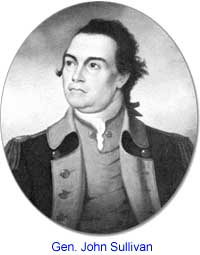|
FRESH STUFF DAILY |
|
|
||
|
|
||
|
|
||
|
SEE ALL SIGNED BOOKS by J. Dennis Robinson click here |
||
Page 2 of 2
Jones wanted to get to Philadelphia immediately and was leaving the next day, November 6 when he was arrested at Portsmouth, New Hampshire. Sheriff Parker of Rockingham County, representing Ebenezer Hogg, presented a court summons to John Paul Jones and his New Hampshire attorney John Sullivan of nearby Durham. Sullivan, who was a Freemason like "brother Jones", agreed to represent the Scottish-born mariner in NH court. Then bowed but not broken, Jones left the Granite State that same day, never to return.
The case came before the inferior court of Hillsborough County on the first Tuesday of April 1783. Paul Jones was off, at the time, as a volunteer with the French in the West Indies. Counsel for the defense Sullivan did not appear either, so the case went to the plaintiff, Ebenezer Hogg. John Sullivan, never a man to waste a penny and highly litigious, was required to pay his client's debts -- so he fired back another legal salvo. Jones was not personally liable for the money owed to Hogg in the first place, the Durham lawyer argued, because he was employed by the United States government during a time of war. The plaintiff had no right to have Jones arrested, bringing embarrassment to the whole state. Worse, it had been orchestrated on the day Jones was required to leave swiftly for Philadelphia in the service of the Congress. Based on that, Sullivan argued in a June 10 petition, that the previous court ruling should be annulled. The lawsuit dragged on. First the plaintiff and his lawyer were unable to make a scheduled court date. Then Sullivan was absent at the next hearing. In a follow-up petition Jones' attorney argued that Hogg was a deserter and, thus, had abandoned his right to any wages. The trial was a mere "vexation" Sullivan argued -- a personal vendetta. In a counter petition, filed in Exeter on the last Tuesday of March, 1784, Ebenezer Hogg contented that he had no choice but to have Jones' arrested by order of the inferior court. Nothing else had gotten the Commander's attention, and Hogg said he had tried every other avenue possible with no response from Jones. He begged the general court not to re-open the trial and to act on its original verdict. Those who believe the modern American court system is biased toward defendants with wealthy influential attorneys should find some comfort in knowing that it has always been that way. Called aggressive and vain, Sullivan had a reputation for suing just about everyone, and winning. Years earlier, 133 Durham citizens had signed a petition to the same grand jury asking for Sullivan's expulsion for what they called his "excessive, extortive behavior." Sullivan won his own case, then attempted to sue the townspeople who had brought suit against him. While the Jones trial dragged on, Sullivan served as Attorney General for the state of New Hampshire. The court, not surprisingly, agreed to annul the original decision and to hear the arguments again, with the condition that, should Mr. Hogg prevail a second time, Mr. Jones and his attorney would be required to reimburse the plaintiff for his legal fees in both trials. The court approved the retrial on April 13, 1784 and authorized it to take place in Amherst in July. It appeared on the July docket, but was continued from one term to the next for over a year. Finally, in September 1785 the New Hampshire case of Hogg vs. Jones was marked "neither party appeared" and dropped from the court docket for good. By this time John Paul Jones was back in France where, ironically, he did collect some of the prize money due to him and his crewman during his famous raid on Britain. By 1785 the powerful John Sullivan was Speaker of the NH House of Representatives. The very next year Sullivan became "president" or governor of the Granite State for the first of three terms. During his final term in 1789, it was "President" Sullivan who welcomed President George Washington when he first stepped onto New Hampshire soil for a four day visit to Portsmouth. Article Source: Adapted from an essay by Otis G. Hammond published in The Granite Monthly, August 1903. Images: 1876 engraving of John Paul Jones from SeacoastNH.com image collection. Portrait of John Sullivan is from the collection in the New Hampshire state legislature By J. Dennis Robinson. Copyright © 2005 SeacoastNH.com, All rights reserved. Firswt published online here in 2000.
Please visit these SeacoastNH.com ad partners.
News about Portsmouth from Fosters.com |
| Friday, April 26, 2024 |


|
Copyright ® 1996-2020 SeacoastNH.com. All rights reserved. Privacy Statement
Site maintained by ad-cetera graphics

 The Shipyard
The Shipyard



















